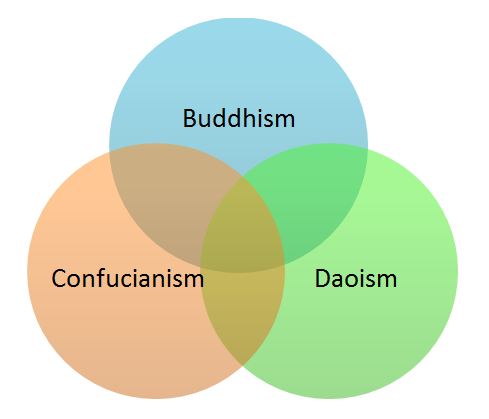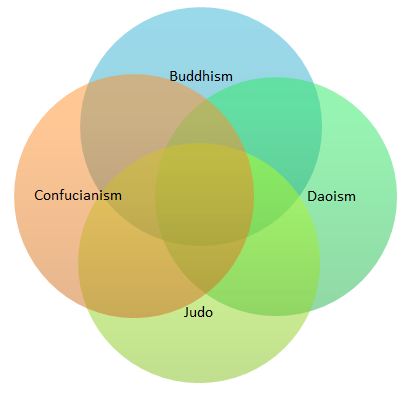Source:
http://www.zenki.com/index.php?lang=en&page=Masunaga03
Zen and Judo
By zen master Prof. Masunaga Reiho
From Zen for Daily Living by Prof. Masunaga Reiho, Page 25, Shunjusha Pablishing Co., 1964.
1. Body-Mind Training
Growing interest in Zen and Judo has gone along with the so-called Japan boom in the West. While superficially quite different, Zen and Judo are essentially similar. Judo is the art of using one's strength, both physical and mental, with maximum effectiveness. Through practice in offensive and defensive tactics, it helps the trainee realize the full potentialities of his body and mind. The successful trainee gains an insight into his true self and emerges with a desire to work for social good. To reach this stage is the ultimate goal of Judo.
This goal jibes with the two ideals of Kodokan Judo to make the most effective use of one's energy and to contribute to the mutual growth of oneself and others. These ideals focus the trainee's effort toward helping others to achieve the same joy-bringing growth. Kodokan Judo differs from the Jujutsu of ancient Japan. Traditional Jujutsu featured many tricks whose purpose was to maim opponent. It was also something of a show put on for paying customers. Jigoro Kano, the founder of Kodokan Judo, changed all this. After studying various ancient Jujutsu schools, he picked out the best techniques and systematized them. Kano did not limit his aim merely to a contest to determine victory or defeat. He made body-mind training an integral part of his system.
2. Kodokan Judo
Though derived from the Jikishin School, the word "Judo" takes in more than the technical. Kodokan Judo, of course, teaches technique, but its main emphasis falls on "do" - the way to self-realization.
It aims primarily at experiencing the "way." In the process the Judoka enjoys a sport and sharpens his ability for self-defense.
In 1890, Kano was sailing back to Japan from Europe. While crossing the Indian Ocean, he was, through a misunderstanding, challenged to a fight by a huge Russian on board. As the fight began, the Russian tried to grab Kano in a bear hug. Kano, seeing an opening, twisted around and threw his opponent with Ogoshi (one of the Judo hip throws).
The Russian arched overhead, seemingly toward a headfirst landing on the deck. But Kana kept a firm grip on his opponent's wrist and brought him down on his feet. The spectators were impressed not only by the well-timed throw but also by the cushioning of the fall. The Russian shook Kano's hand. They parted good friend. This episode underscores the Judo ideals of strength fully used and of mutual growth.
3. Art of Falling
Learning in Judo begins with ukemi - the art of falling. By practicing ukemi the trainee learns to fall safely no matter how he may be thrown. At the same time, he builds up his own confidence and deepens his interest in Judo.
Next, the trainee learns the art of throwing. He develops an under- standing of how to use his strength most effectively. By constant practice he begins to master the various ways to break his opponent's balance and make a throw. A throw, it is said, must be practiced 3,000 times before it can become effective.
Judo mat-work, although not too popular these days, must also be practiced. It is just as important to the mastery of Judo as the art of throwing. The two go together like the two wheels of a cart.
In working out with an opponent, the Judo trainee should move relaxed and tryout his newly learned techniques without hesitation. He must act positively: when thrown, he should break his fall, arise immediately, and resume the attack. To test his strength, the trainee should occasionally take part in Judo tournaments.
Quite often, a new set of attitudes develops as a result of this training.
The trainee may find himself:
More relaxed in any situation.
Convinced of the need for learning from a good teacher.
More eager to practice techniques as taught.
Less tempted to try "dirty" tricks.
More sensitive to opening in the opponent's defenses while less concerned about one's own.
Always poised to make effective use of the opponent's strength.
Accustomed to silence and calmness, and
Naturally disposed toward simplicity and cleanliness.
Judo training, in short, stimulates courage and freedom of action, teaches constant awareness and resourcefulness, and helps develop respect for human dignity and tempers body and mind for vital social action. With flexibility and grace, or in the words of an ancient text, like a shadow following an object, the Judoka quietly does his part of the world's work.
4. Relation with Zen
In Tokugawa Japan, master swordsmen like Yagyi Tajima-no-Kami and Miyamoto Musashi studied Zen to learn the innermost secret of swordsmanship. They often took up Zen training under famous masters. Some, after the usual round of sharp criticism and psycho-physical discipline, managed to gain enlightenment. A similar relationship holds for Judo and Zen.
Gaining of full Zen enlightenment does not differ from experiencing the ultimate meaning in Judo. In this way, both Zen and Judo trainee come upon the truth of life. Through intensive training they experience what it is to know coolness and warmth for oneself. As Dogen has said, Training enfolds enlightenment. Enlightenment dwells within training, and training takes place within enlightenment.
5. Hardship Necessary
One cannot know anything deeply or experience it completely with out undergoing some hardship. While Zen has been called the comfortable entrance, it is actually not so easy. The trainee usually gets up early in the morning to practice zazen (cross-legged sitting). During sesshin (the special training period), he does zazen for seven days. Cold and sleepiness disturb him, and his feet and legs begin to hurt. Usual monastery routine demands that the trainees sweep the garden in the morning and do zazen again in the evening.
Similarly, Judo has its special training period-kangeiko (winter practice) and doyogeiko (summer practice). Having gone through both kangeiko and Zen training, I can vouch for the fact that neither is easy. But only through disciplined practice without regard for heat and cold the trainee can gain an inkling of what a total experience means in Zen or Judo. You don't learn swimming by practicing on the tatami.
6. Relaxed Mind
Both Zen and Judo grow out of the self-identity of body and mind. To train the body and mind in Zen the emphasis falls on letting go in the truly existential sense. Dogen, it is said, transmitted the relaxed mind from China "Relaxed" of course does not mean "soft". It means breaking free from the tyranny of the ego and penetrating to the not self or the Self. Freed even from the desire for enlightenment, one understands finally what makes the world tick.
In Judo, too, the body and mind are relaxed. There is no burning desire to win. The Zen insight into the non-duality of body and mind dwells at the center of Judo. A Zen-calmed mind expresses itself in integrated action. Full function of body-mind leaves no opening.
A lion, it is said, uses his full effort to catch a rabbit. The same is applied to Judo. One throws, holds, and wrestles going all out, but without strain. The body shifts immediately to adjust to changes in time and place. Those with Judo sense escape injury in usually dangerous falls. They can take care of themselves with ease against violence.
So Judo goes beyond mere self-defense. It builds up character and leads to responsible freedom. Harmonizing with nature, Judo stresses effortless action. Similarly, Zen respects the natural order of things. One's every day mind is itself the way is a well-known Zen expression.
7. No Aftermath
Just as the bird in the sky and the fish in the water leave no traces of their passing, Judo leaves no aftermath. The breaks are clean. In Judo as in Zen, when awareness is full, every action embodies vital freedom. The great masters of Zen and Judo move along the same path of no-hindrance.
The Zen trainee understands "no-hindrance" primarily through zazen in upright sitting and rhythmic breathing. This training method strikes most Westerners as rather strange. But it corresponds to the throws practiced 3,000 times in Judo. Both Zen and Judo, therefore, put their basic emphasis on ultimate freedom and creativity. The Zen trainee not only must absorb all that the master has to teach but also must excel him. The trainee has to transcend his teacher. This, as Prof. Eugene Herrigel has said in his Zen and the Art of Archery, means, to climb on the shoulders of one's teacher. Judo also has many creative aspects, least subtly perhaps in the development of new techniques. It too uses form to wean man away from enslavement to form.
When fully experienced, Zen and Judo help replace illusion with insight. They give us a fresh approach to the terms of the world. Previously routine activities then take life, and we find the buried wisdom in what seems at first glance to be the least rewarding of Zen sayings, Every day is a good day: every hour is good hour.
8. Zen and Sports
The spirit of Zen is not only important for Judo but for all sports. Zen puts stress on living fully in the moment, and this mood is necessary to all sports. Both Zen and sports also emphasize training (the so-called sport samadhi), observance of rules, learning from masters, and objective excellence. Other similarities include their common stress on attention to details, grace of movement, and growing by participation. While perhaps less evident in some sports than in Zen, is not the ultimate aim of both freedom from obsession to defeat and victory? The Zen of sport and the sport of Zen can both lead to more meaningful living.





